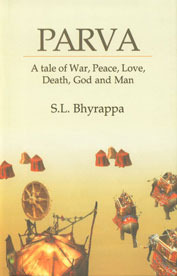Parva by S.L.Bhyrappa - Review by Abhishek Desikan
Parva can only be described as a magnum opus. Reviewing an epic comes with the obvious challenge of not being able to capture all of its glory. How does one view it? At its heart, it is a retelling of the Mahabharata, stripped of its mythological aspects. But to leave it at that would be a gross injustice. One may consider it a commentary on what Dharma is. We discover the politics, warfare, and strategy of the Vedic times. There is an exploration of a wide range of human emotions, from jealousy to ecstasy. Simply put, as the cover suggests, it is a tale of War, Peace, Love, Death, God, and Man.
I have read quite a few retellings of the Mahabharata, and some are narrated through the lens of one character in the epic (Bhima, Gandhari). But Parva encompasses them all! A series of flashbacks from all the epic’s notable characters take the story forward, and it is done with the onset of the great war.
While the question of what encompasses Dharma has an undercurrent throughout the tale, all these characters' human emotions and personalities put the story in a whole new light.
Was it really a battle between two rival siblings, or was it the conclusion of a long struggle between two rival kingdoms - The Panchalas and the Kurus? Why was Bhishma siding with the Kauravas? Was the practice of Niyōga against Dharma? Was Arjuna really as virtuous? Were Bhima and Krishna right in claiming that following Kshatriya Dharma led to the Pandavas' eventual downfall at the dice game? How did Draupadi view her relationship with the Pandavas? The dynamics between two respected Sūtas, Vidura and Karna. The role of Sūtas as the bearers of Kshatriya men’s children out of wedlock and as charioteers. The backstory of Krishna fleeing from Mathura to Dwaraka and his eventual usurping of Jarasandha. On the relationship between Krishna, Balarama, and Satyaki. On how the Nāgas (depicted as tribals) and Raksasās were viewed with disdain by the Aryan folks. It goes on and on. Every character is extolled only to be brought down the next instant, making this book so enjoyable. The myriad interwoven stories and motivations and beliefs, all coming together, make for an absolutely fascinating read.
The translation to English from the original in Kannada makes a few passages mundane. Some of the conversations between characters provide comic relief, which acts as a counterbalance to the overall narration’s grave nature.
And then we come to the war itself, and what a narration it is! If for nothing else, just the names of characters and kingdoms and their alliances with the Kauravas or Pandavas alone makes one gape in awe. The war is described elaborately, along with all the difficulties accompanied - the stench of human and animal waste, the lack of grain, water, other resources, the fear of death, the tactics involved, the slow decline in the rules agreed upon, the ego battles, the corpses increasing in the battlefield and being devoured upon by vultures, dogs and jackals. It is as gruesome and grave as any real war would have been.
When the war comes to a close, one senses the devastation and the loss of lives on both sides. The entire Aryan lineage is decimated. Bhyrappa ends it with a long drawn passage reflecting on the ruin spread across the kingdom and beyond, with the Yadavas fighting each other unto death and the pregnant Sūta women questioning their plight to Yudhishtra.
That Bhyrappa is a legend is unquestionable. Reading his opus Parva makes one wonder how many more Indian classics are waiting to be discovered because they’re written in a regional language.

Originally published here.